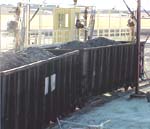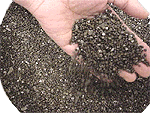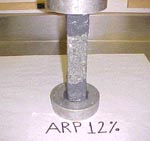Asphalt Replacement Pellets
(ARP)
For heavy duty, rigid pavements
Home
Independent
Laboratory
Procedure
Safety
About Us
History
Contact
"Quality Polymer Performance at Conventional Asphalt Prices"
Rock Binders has engineered an extraordinary new form of asphalt binder for paving mix designs, Asphalt Replacement Pellets (ARP). Solid at ambient temperatures but meltable in your hot plant, ARP combines sulphur extenders with an asphalt base. ARP totally replaces liquid asphalt in the paving matrix, eliminating heating and storage problems associated with liquid binders. The resulting pavement has exceptional performance and is very stable.
ARP (Asphalt Replacement Pellets) are manufactured and delivered to the hot plant in 3/8" minus pellet form. They can be stored on the ground or in silos for use in a feeder/delivery system. A typical hot mix application would introduce and incorporate ARP through the drum RAP collar and/or bag house intro point, through an after-mixer, or into the pug mill in a batch plant operation. Substitution of 1.8 to 2 parts ARP for 1 part asphalt is optimal.
|
 |
 |
Some ARP mixes show only micro-cracks to -40° F (below zero). Available by bulk container, truck or rail. |
ARP has unlimited shelf life because of its solid nature and requires no storage heat. It is a perfect choice for remote sites or isolated areas where it is difficult and costly to transport liquid asphalt. ARP can be shipped conventionally by rail, truck, ship or air to anywhere in the world.
ARP (Asphalt Replacement Pellets) are a replacement binder that allow you to make a Portland cement concrete (PCC) type heavy duty pavements that is made and placed with conventional asphalt paving equipment and similar methods. It has been likened to a "hot" PCC pavement that is paved similarly to mixes made with conventional asphalt cement. ARP melts readily into hot aggregate during mixing in the hot plant mixing chamber and becomes the binder of the heavy duty pavement mixes.
The ARP substitution ratio (ratio of regular asphalt (bitumen) replaced with ARP) recommended for most mixes is 1.8 to 2 times the regular asphalt percentages. This is suitable for use in strong road structures for which the static deflection does not exceed 1.25 mm.
The advantage of the ARP binder mixes is that they can be handled and compacted similar to conventional asphalt mixes but with performance of an acid resistant PCC. This type of pavement was originally created and paved with the help of the US Bureau of Mines and Federal Highways "plasticized Sulfur" projects of the '70's and '80's. ARP was designed and approved by Dr. McBee, the champion of plasticized Sulfur for the Bureau. It was designed as a total replacement for the asphalt (bitumen) portion of the pavement. ARP is the binder for a heavy duty pavement that is acid resistant and very durable. Several plasticized Sulfur projects have been in place in for over 20 years and ARP allows for easier construction of these high performance pavements.
The amount of asphalt cement replaced by this type of mix is 100% and the recommended replacement is 1.8 - 2 times the weight of the original binder, based on experience (i.e. replacement value, R = 1.8).
While paving ARP in Las Vegas we noticed the mix appeared dry compared to regular asphalt mixes and a brownish color to the mix. This is quite normal and there can be a colorant added to the mix if desired. Minimum thickness' of ARP mixes should be 6 inches to accomplish a structure similar to the PCC pavements.
In hot weather, rut resistance is excellent; cold temperature performance is also outstanding.*
ARP even reduces the need for stability testing during the mix design process, because this binder often produces a paving mix with stabilities higher than can be measured with today's conventional testing equipment! In addition, the stabilities continue to increase over time without losing hot or cold temperature properties
Rock Binders' Asphalt Replacement Pellets:
- Eliminate tank and drum storage
- Stockpile up to 40 ' high with no environmental leaching
- Provide environmental stability; store in solid form with no storage emissions or spills
- Offer cost advantages, including transportation, logistical, heating and storage, liability reduction
- Improve pavement's strength and rut resistance
- Perform well in cold temperatures due to their base of high quality asphalt and polymers
*(Western Research Institute, Phase II - Final Report of August 1997 FHWA Contract DTFH61-92-C-00170 & FHWA-RD-90-110).
